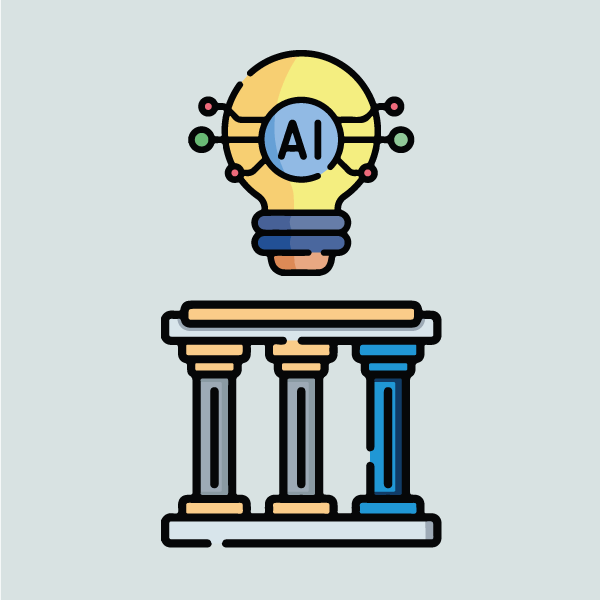The UCT AI in Education Framework sets out the university's roadmap for AI literacies, ensuring academic integrity and supporting AI innovation.
Introducing UCT's AI in Education Framework
Artificial intelligence technologies are becoming part of our daily lives and starting to reshape teaching and learning in universities. Staff and students are using tools such as ChatGPT, Claude and Gemini in innovative and productive ways, while at other times these technologies present significant challenges, requiring us to rethink teaching pedagogies, assessment practices and the fundamentals of what a university experience should be.
UCT is committed to providing an enabling environment and systematic approaches to shape and support staff and students in responsible and ethical use of these technologies.
Under the direction of the Deputy Vice-Chancellor (DVC) for Teaching and Learning, UCT has developed the UCT Framework for AI in Education: Generative and other AI in Teaching, Learning and Assessment.
Initiated in 2024, this process was led by the Online Education Subcommittee (OESC), which has compiled the framework in consultation with institutional stakeholders. The framework was endorsed by the Senate Teaching and Learning Committee in June 2025 and communicated to the UCT community via DVC desk.
This framework is intended to serve as a centralised reference for responding to AI in teaching and learning and outlines several key purposes:
- To provide practical guidelines on the responsible and effective use of AI in education at UCT;
- To promote AI literacies and ethical use among students and staff;
- To ensure the integrity of assessment in an AI-mediated environment;
- To promote reviewing curricula that accommodates AI technologies appropriate to the discipline; and
- To consider the potential of AI technologies to support innovation in teaching and learning.
Three Pillars of Engagement with AI
The framework outlines three pillars of engagement with AI, which are currently being promoted and implemented across the institution:
1. Promoting AI Literacies

UCT is committed to foster the development of critical AI literacies as a key competency for staff and students. Based on the literature and emerging practices at universities, an AI Literacies framing for UCT has been developed, focusing on five topics covering knowledge, skills, and dispositions, with an emphasis on critical thinking and human-centred engagement with AI tools. AI literacies aim to equip staff and students to understand and use GenAI ethically and responsibly.
There is ongoing work to support UCT staff and students in developing AI literacies, including:
- Guides for staff and students on the use of AI tools in education, assessment and research in various formats, available on the CILT webpage;
- Interactive self-paced modules on Amathuba for staff and students; and
- UCT Libraries AI LibGuide providing basic information on the ethical use of AI tools for research.
2. Ensuring Assessment Integrity

In line with global higher education trends, UCT recognises that assessment practices must continue evolving to ensure integrity and validity. Currently, many traditional assessments can be partially or wholly AI-generated, while AI detection tools remain unreliable and their use is not supported at UCT. Existing assessment types or modes may need further adaptation, and assessment redesign is an ongoing process. The framework recommends that departments engage students to ensure they are aware of the guidelines for the use of GenAI in assignments. The framework also acknowledges that assessment review and redesign require ongoing effort from staff and that support is available and continues to be developed.
Support, consultations, and guides on redesigning assessments, aligned with UCT’s Assessment Policy, are currently available through CILT:
3. Exploring AI-Enabled Innovation

The innovation pillar signals UCT’s ongoing efforts to explore, test, and where appropriate, integrate AI into its educational practices. AI-enabled innovation in teaching and learning continues to be investigated with a focus on leveraging the affordances of these emerging tools to enhance teaching and learning, as well as considering how these tools may contribute to UCT’s institutional imperatives (such as supporting multilingualism, curriculum change and redesign, advancing digitally enabled education, and supporting student success).
There are current opportunities for innovation, including:
- The establishment of a special purpose AI innovations grant by the DVC for Teaching and Learning to build expertise and understand the most beneficial applications of AI in teaching and learning contexts;
- AI tools provided within Amathuba as part of the D2L Lumi suite; and
- Piloting AI for generating notes from lecture videos to enhance accessibility and student learning.
Development Process and Consultations
The UCT AI in Education Framework was developed through a consultative process, and included engagements with:
- The AI in Education Working Group (September and October 2024);
- The Online Education Subcommittee (October 2024 and June 2025);
- The Students’ Representative Council (November 2024);
- The Senate Teaching and Learning Committee (November 2024 and endorsed in June 2025) ; and
- Faculty teaching and learning committees, key support and service departments and students (February-May 2025).
For more information about the framework, please contact the Chair of the Online Education sub-committee: Sukaina.Walji@uct.ac.za
UCT AI in Education Community of Practice
The AI in Education Community of Practice (CoP) brings together UCT staff who are exploring how artificial intelligence is shaping teaching, learning, and assessment. Evolving from the UCT AI in Education Working Group (established in 2023), the CoP is a cross-institutional space for collaboration, experimentation, and shared learning.
Chaired by Sukaina Walji and supported by CILT, the CoP connects academics and professional staff from all faculties and departments, including UCT Libraries, ICTS, and the Institutional Planning Department. Together, members exchange ideas, test tools, and co-develop resources that promote responsible and creative uses of AI in higher education.
Our ongoing focus areas include:
- Building AI awareness and literacies;
- Facilitating workshops and learning opportunities;
- Exploring ethical and inclusive AI practices;
- Supporting assessment and academic integrity;
- Sharing innovations and research; and
- Developing frameworks and resources.
In 2026, the Community is expanding its work through new podcasts, collaborative resources, and themed workshops to help UCT staff navigate and shape the evolving AI landscape.
Visit our AI in Education Community of Practice page.

